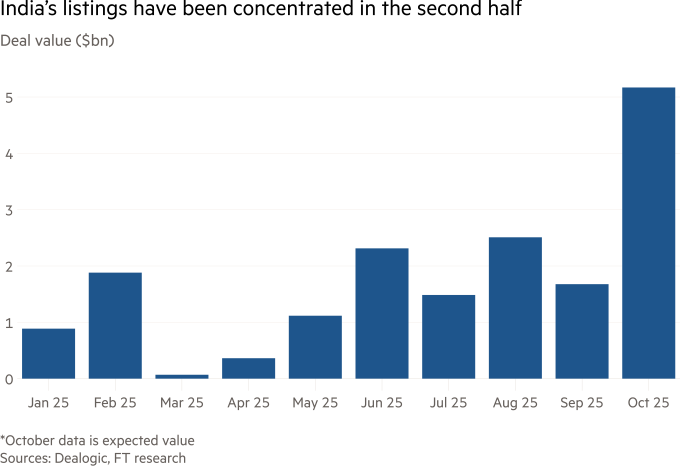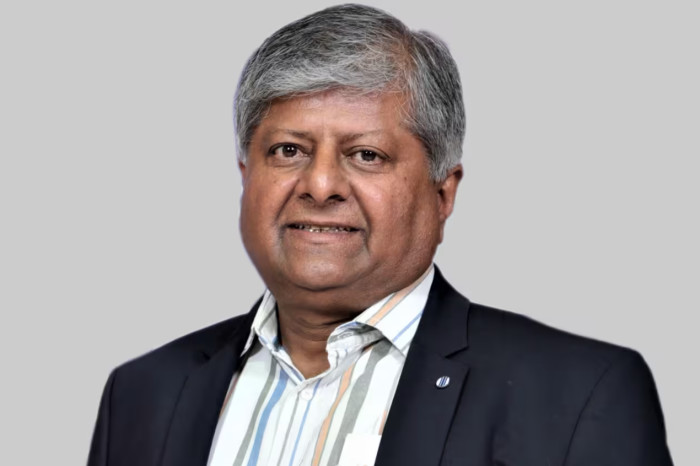Good morning. India’s retail inflation slowed to an eight-year low of 1.54 per cent in September. This is well below the central bank’s tolerance range of 2-6 per cent. How will this influence the rate decision in December? Send me your thoughts.
“Diaspora” is the keyword in today’s newsletter. The Indian watchmaker Titan is expanding its range of luxury watches as it looks for an international market beyond the Indian diaspora. Which is just as well, because the country’s stock market regulator is making it easier for Indians abroad to invest their money in domestic equities.
Homebound
India’s market regulator is looking to attract investment from overseas Indians into domestic stocks. The Securities and Exchange Board of India (Sebi) is simplifying the know-your-customer process so that non-resident Indians can invest in Indian equities without having to travel to their home country to set it up. Sebi chair Tuhin Kanta Pandey called this an “urgent goal” for the regulator. Current regulations mandate a ton of paperwork and, often, in-person presence in the country for non-resident Indians before they can invest in the markets. Once set up, they have to refresh this every couple of years.
These strict measures were designed to prevent money laundering, but now Sebi is working with the central bank and operators of the country’s digital identification system, Aadhaar, to use technology to make the process accessible from all parts of the globe.
The regulator’s move, whose timing is yet to be announced, comes as the Indian stock market experiences a slowdown in investments by resident Indians as well as large outflows from foreign portfolio investors. The Indian diaspora of 35mn accounts for $135bn in remittances home, the highest in the world. Channelling part of this into the stock market will help increase the depth of the market, especially as a significant portion of this money will be longer-term investments.
Although a larger number of resident Indians are now open to investing in stocks (traditionally the preferred method of savings has been bank deposits because they are less risky), the numbers are still small. Less than 10 per cent of Indian households participate in the securities market, and a majority of them invest through monthly plans offered by mutual funds. But even these inflows into equity funds have been shrinking this year, with September numbers showing 9 per cent degrowth, as markets remain sluggish. The numbers are far worse for foreign portfolio investors, who have withdrawn $2.7bn last month and are on track for a record year of outflows.
While Sebi is right in making investing easier for the diaspora, their money will flow into Indian securities only if the markets are attractive. Benchmark indices are flat to negative this year. Growth numbers for this crucial third quarter hold the key to what happens next.
Do you think the Indian market is currently attractive for non-resident investors? Hit reply or email us at indiabrief@ft.com
Recommended stories
In Gaza conflict milestone, Hamas has released all 20 living hostages and Israel freed Palestinian prisoners.
US and Chinese officials will hold talks this week about escalation in trade tensions.
Afghanistan claims it killed 58 Pakistan troops in border clashes.
Wall Street investment banking revenues set to top $9bn.
Stella Li, the executive at the heart of BYD’s global push.
Washington University-Fudan programme tops the salary table in the FT’s 2025 Executive MBA Ranking.
Titan goes luxe

Indian watchmaker Titan, a familiar name in the domestic market, is making its way in the hallowed world of luxury watchmaking. The company has set its sight on producing luxury mechanical watches that will offer engineering quality, value and Indian craftsmanship. The first step towards this was its launch of Nebula Jalsa, a $46,000 watch with an in-house tourbillon movement (designed to increase its accuracy) and a hand-painted dial.
The Tata-owned brand is well known in India for its sturdy, battery-powered quartz watches that sell for less than $100. But in recent years it has also built a premium portfolio. In April it produced about 3,000 mechanical watches, a figure that by September had increased to 500 a day. Its monthly mechanical output is now 11,000 watches.
However, though volume is not a challenge, in this segment, quality might be. Currently, Titan’s standard mechanical movements offer accuracy of -10 to +30 seconds a day, and power reserves of around 36 hours. A Swiss chronometer is accurate to -4 to +6 seconds a day, while Rolex’s benchmark narrows to -2 to +2.
But Titan is staying the course and addressing technological as well as design challenges. The Helios division, which makes these luxury watches, is growing at 30-35 per cent quarter on quarter, chief financial officer Ashok Sonthalia told investors earlier this year. This adds to Titan’s strategy of geographical diversification and looking for growth in the international market not just for watches, but also for jewellery — its other, larger, business. In July, the company announced its acquisition of 67 per cent of the UAE-based jewellery brand Damas. At the time, managing director C K Venkataraman had said this was intended to help the company diversify its international customer base to groups outside of the Indian diaspora.
Titan’s focus on global markets is a smart move, and its strategy of going beyond the Indian design ethos will help it access a wider, more global, customer base. Its expansion in the Middle East is also coming in handy now, as Donald Trump’s tariffs make exports from India more expensive. Venkataraman says the company is examining the feasibility of manufacturing and exporting to the US from the gulf region. Will Titan be the answer to the long-standing complaint about the dearth of good global brands from India? Well, the signs are good and the time is right.
Go figure
India is set for a blockbuster month of initial public offerings. Two of the year’s biggest IPOs hit the markets this week, with the $1.7bn listing of Tata Capital and the $1.3bn debut of LG Electronics’ India business today.

My mantra
“I hang around the pantry during lunch, moving from table to table. The mantra used to be leadership by walking the corridors, I have modified it to leadership by sharing lunch. One of our big problems now is that we are a large organisation, and the only news that reaches me is what people think I want to hear. This is the best way of knowing what your people are actually saying and what the market buzz is.”
— Shashi Sinha, head, IPG Mediabrands

Each week, we invite a successful business leader to tell us their mantra for work and life. Want to know what your boss is thinking? Nominate them by replying to indiabrief@ft.com
Quick question
This week, India announced it will reopen its embassy in Kabul. Do you think India is right in pursuing diplomatic engagement with the Taliban administration in Afghanistan? Tell us here.

Buzzer round
On Friday, we asked: How will Japan’s Sanae Takaichi make history when she is sworn in later this month?
The answer is . . . she will be Japan’s first female prime minister. Although things look a little shaky now!
Aniruddha Dutta was first with the right answer, followed by Srinath V, Mahithi Pillay and Prasanna Venkatesh. Congratulations!
Thank you for reading. India Business Briefing is edited by Georgina Quach today. Please send feedback, suggestions (and gossip) to indiabrief@ft.com.


